Key takeaways:
- Experiential learning enhances understanding by engaging directly with real-world situations, bridging the gap between theory and practical application.
- Reflection is crucial for personal growth, helping individuals process experiences and learn from both successes and setbacks.
- Effective reflection techniques include journaling, discussions with trusted individuals, and mindfulness practices, which facilitate deeper insights and clarity.
- Applying reflection in daily life can improve relationships and transform failures into opportunities for learning and resilience.
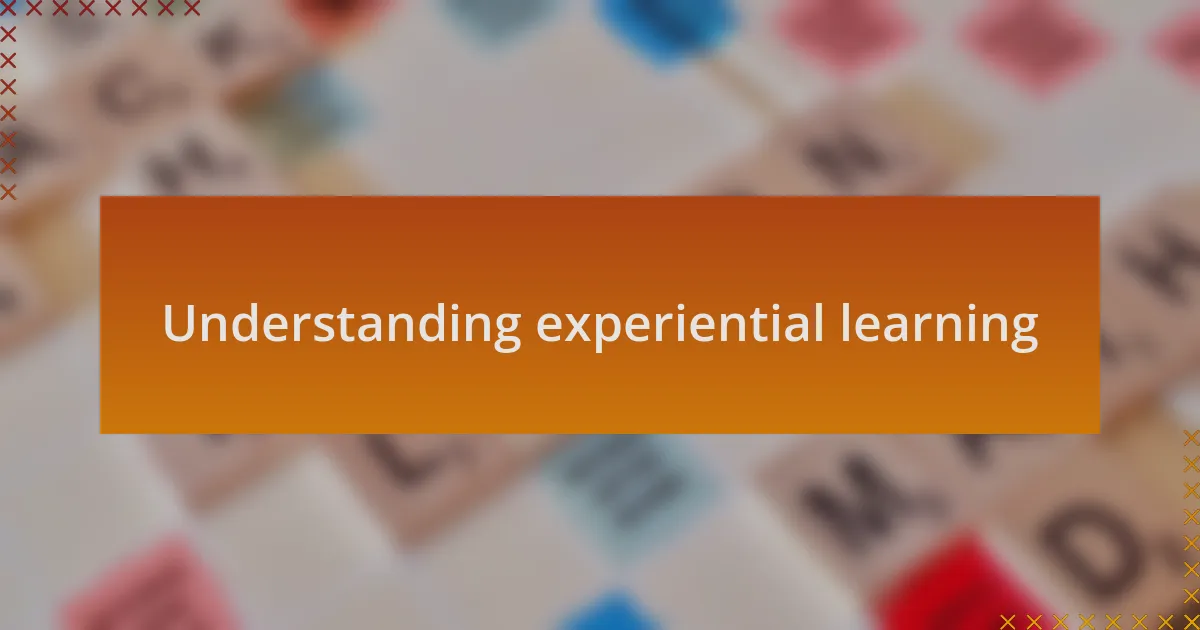
Understanding experiential learning
Experiential learning is a process where knowledge is gained through direct experience, often leading to deeper understanding. I still vividly remember my first time volunteering for a community project; it was a whirlwind of emotions and realizations. Can you recall a moment when doing something hands-on taught you more than theory ever could?
Engaging actively in learning—whether through experiments, internships, or service—brings concepts to life in a way that books simply cannot. For instance, while completing a sustainability project, I realized the intricacies of environmental issues by observing them firsthand. How often do we miss the bigger picture when we limit ourselves to the classroom?
At its core, experiential learning encourages reflection on our experiences, helping us connect the dots between what we’ve learned and how we apply it in real life. Reflecting on this journey often evokes a sense of fulfillment and clarity. Have you ever felt that rush of insight after working through a challenge?
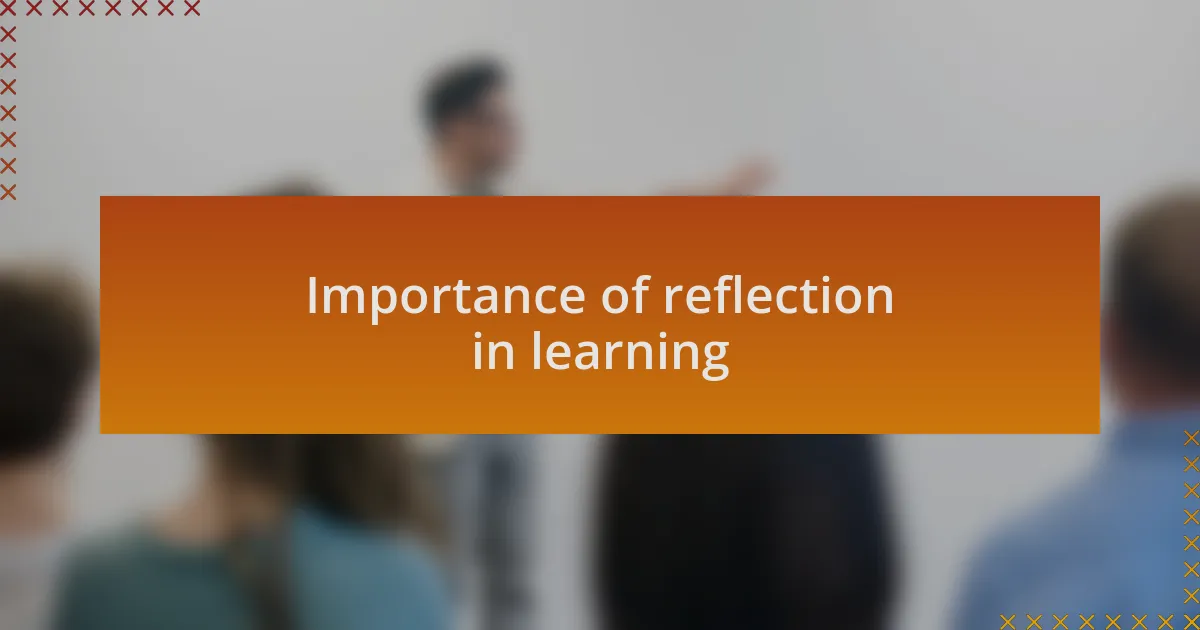
Importance of reflection in learning
It’s easy to overlook the power of reflection in our learning journey, yet it can be transformative. I recall a time when I took part in a workshop that, on the surface, seemed ordinary. However, after the session, when I took a moment to reflect on what I had learned, I uncovered insights that reshaped my perspective on teamwork. Why is it that some experiences stick with us while others fade? Often, it’s the moments we pause to ponder that leave a lasting impact.
Reflection serves as the bridge linking our experiences to our future actions. I remember journaling after a challenging project, and that simple act of writing allowed me to pinpoint not just my mistakes but also my successes. It’s fascinating how articulating thoughts can illuminate paths we didn’t even realize we could take. Have you ever written down your thoughts and suddenly felt clarity wash over you?
Moreover, reflecting on our experiences cultivates a habit of continuous improvement. In my own journey, I’ve found that when I take time to evaluate what worked and what didn’t, I become more prepared for future challenges. Isn’t it empowering to realize that each reflection can guide us toward becoming better learners and individuals?
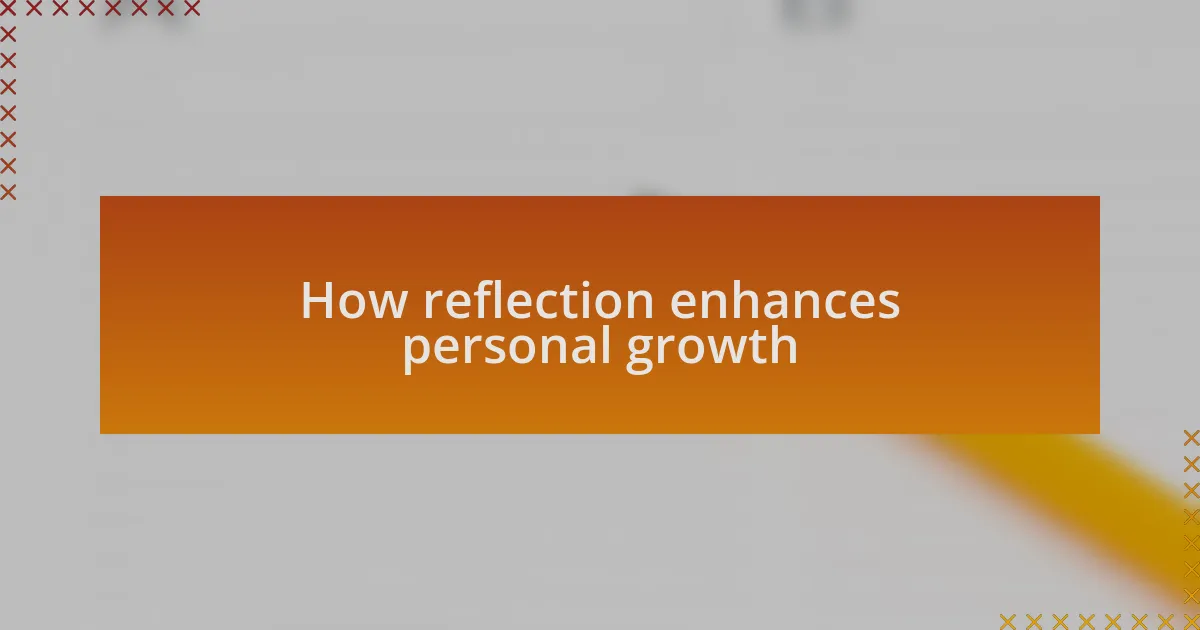
How reflection enhances personal growth
It’s interesting how reflection can unlock aspects of our personal growth that we often overlook. I remember a time when I participated in a group project that initially felt overwhelming. After taking a step back to reflect on my contributions and interactions, I noticed how my communication skills had improved. It prompted me to embrace my strengths and seek areas for growth, building my confidence in collaborative environments.
Each time I engage in reflection, I uncover deeper layers of my experiences that inform my choices moving forward. For instance, after facing a setback in my career, I took time to think about what went wrong. This process led me not only to recognize my missteps but also to appreciate the resilience I had cultivated throughout that journey. Have you ever considered how reflecting on failures can lead to newfound strengths?
Furthermore, reflection encourages a mindset of curiosity and openness to change. I often find that the more I reflect, the more I crave new experiences and challenges. It’s like feeding a growing appetite for knowledge. The question then becomes, how can we harness this desire to enhance our personal growth further? Embracing reflection facilitates this journey, fostering a continuous cycle of learning and self-improvement.
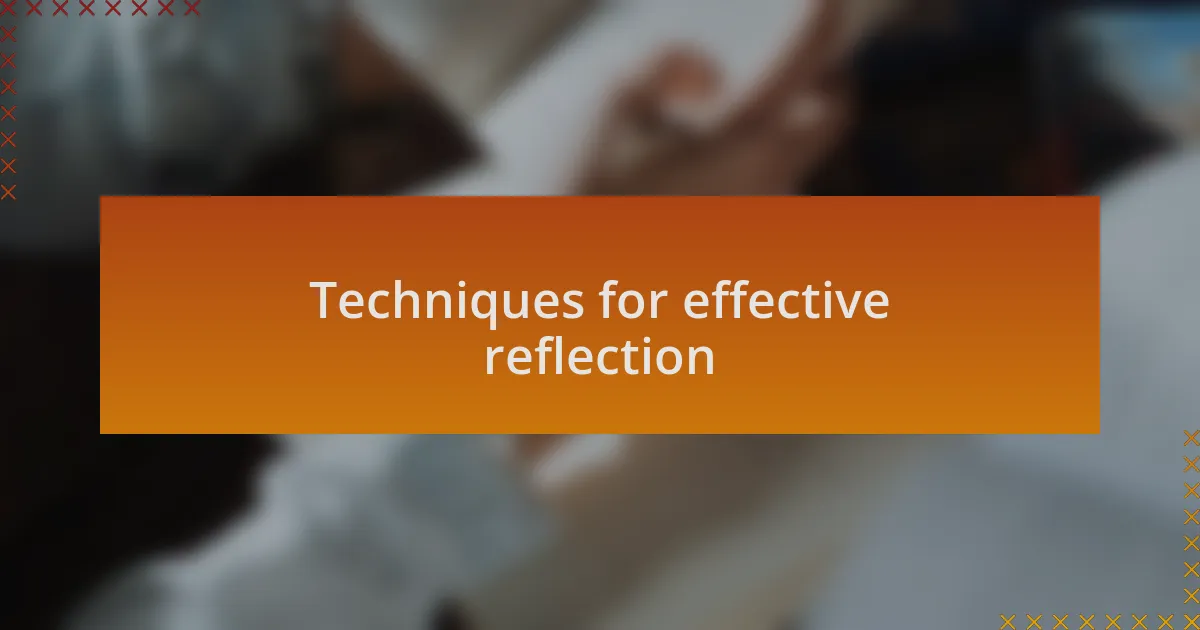
Techniques for effective reflection
When I think about effective reflection techniques, journaling always comes to mind. Writing down my thoughts not only gives me clarity but also helps me process emotions I might overlook in the moment. Have you ever tried putting your feelings on paper only to discover deeper insights about a situation? For me, it’s like uncovering layers of ice in a lake, revealing the rich depths below.
Another technique I find invaluable is talking it out with someone I trust. A simple conversation can illuminate perspectives I hadn’t considered. I remember discussing a challenging experience with a friend, which opened my eyes to how my insecurities shaped my reactions. There’s something magical about a fresh viewpoint that can turn a solitary reflection into a collaborative exploration.
Lastly, I’ve started to incorporate mindfulness practices into my reflection routine. Taking a few minutes to breathe deeply and center myself allows my thoughts to flow more freely. It’s amazing how this stillness can lead to moments of clarity that rush in like a tide. Have you ever noticed how silence can amplify your inner voice, prompting revelations you didn’t see coming?
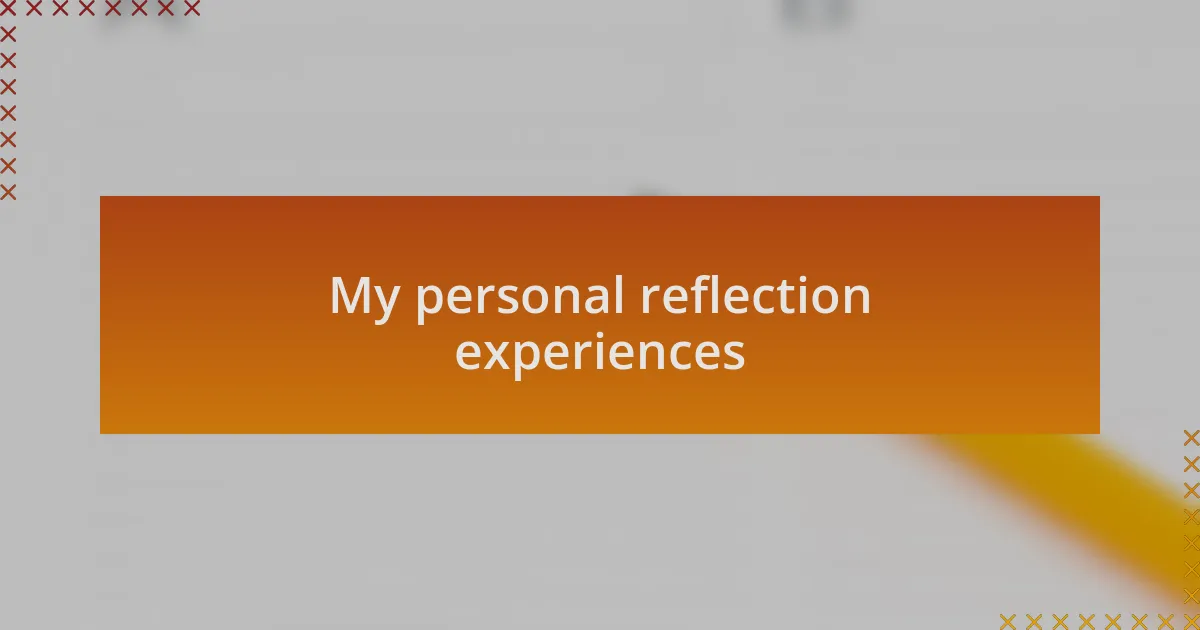
My personal reflection experiences
Reflecting on my own experiences, I’ve found that nature often serves as my greatest teacher. During a recent hiking trip, I paused on a rocky ledge to take in the view, and in that moment, I felt a profound sense of peace. Have you ever been so immersed in your surroundings that time seemed to vanish? For me, the gentle rustle of leaves and distant bird songs created a backdrop for introspection that revealed my thoughts in vivid detail.
One memorable occasion was when I volunteered at a local shelter. The energy of giving back sparked a range of emotions, from joy to vulnerability. While cleaning up after a meal, I struck up a conversation with a fellow volunteer, and our discussion propelled me to think about my own privilege as well as the disparities others face. Isn’t it fascinating how deep connections can arise from shared labor, pushing us to examine our own lives and the differences that shape them?
Lastly, I often turn to art as a vessel for reflection. I vividly recall an evening spent sketching by the water, where every stroke felt like a release of pent-up thoughts. The colors I chose seemed to mirror my emotional state—bright hues for excitement, deep blues for contemplation. Have you ever found that creative expression allows your emotions to spill onto the canvas of your life? In those moments, reflection becomes not just an exercise, but a dynamic dialogue between my inner self and the world around me.
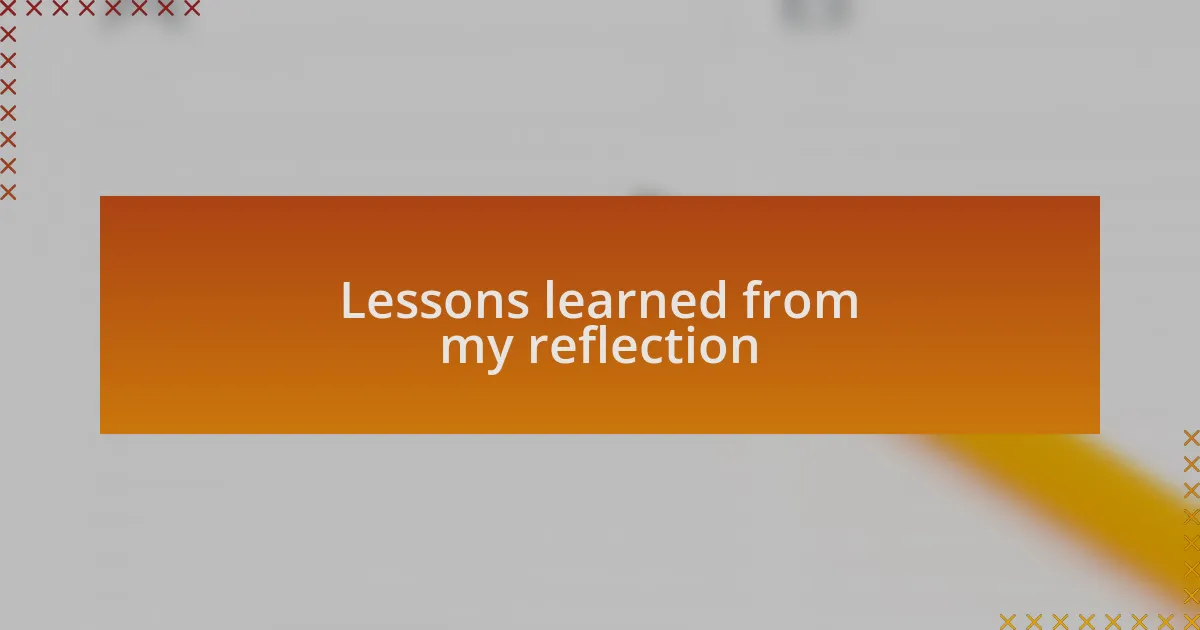
Lessons learned from my reflection
When reflecting on my experiences, I’ve learned the importance of vulnerability. One night, I attended a workshop where sharing personal struggles was encouraged. As I opened up about my fears, I felt an incredible weight lift off my shoulders. Isn’t it interesting how sharing our challenges can forge connections with others, reminding us that we are not alone in our journeys?
Another lesson that surfaced during my reflections is the necessity of patience with myself. I remember a particularly frustrating day when I was learning a new skill, feeling overwhelmed and ready to give up. Thinking back on that experience, I realize my growth required time and persistence. How often do we rush our personal development instead of allowing ourselves the grace to evolve?
Lastly, I’ve discovered the power of observing my reactions in various situations. During a heated discussion with a friend, I caught myself reacting defensively. This moment of awareness taught me about the impact of ego in communication. Reflecting on this incident helped me understand that my responses often reflect deeper fears. Have you noticed how self-awareness can transform not just your perspective, but also your relationships?
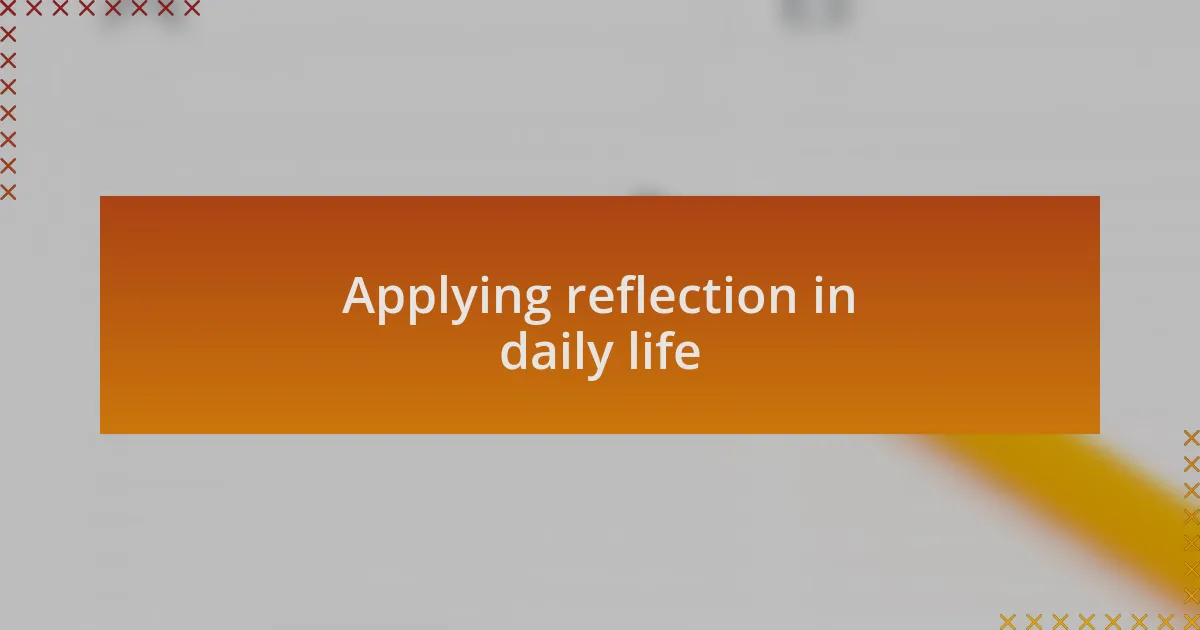
Applying reflection in daily life
Applying reflection in daily life is about weaving moments of contemplation into our routines. I remember a morning when I felt unusually anxious as I prepared for a big meeting. Instead of pushing that feeling aside, I took a few minutes to reflect on what was causing it. This simple act of acknowledging my emotions rather than ignoring them gave me a clearer sense of purpose and the strength to navigate that meeting with confidence. Isn’t it amazing how just a moment of reflection can ground us?
Engaging in daily reflection can enhance our relationships too. I once had a disagreement with a colleague that left me feeling frustrated and misunderstood. Instead of harboring those feelings, I took time to think about the encounter. What was my role in the misunderstanding? By examining my perspective, I learned to approach future conversations with more empathy and clarity. Don’t you think that learning to empathize can truly strengthen our interactions?
I’ve also found that journaling can be an incredibly powerful tool for reflection. When I put pen to paper, I often uncover thoughts and feelings I didn’t realize were there. One evening, I found myself writing about a recent failure. As I recounted the event, I began to see it not just as a setback but as a stepping stone towards growth. What if we all took that approach—turning our failures into valuable lessons? By embracing this practice, I’ve transformed my perspective on challenges into opportunities for learning and resilience.